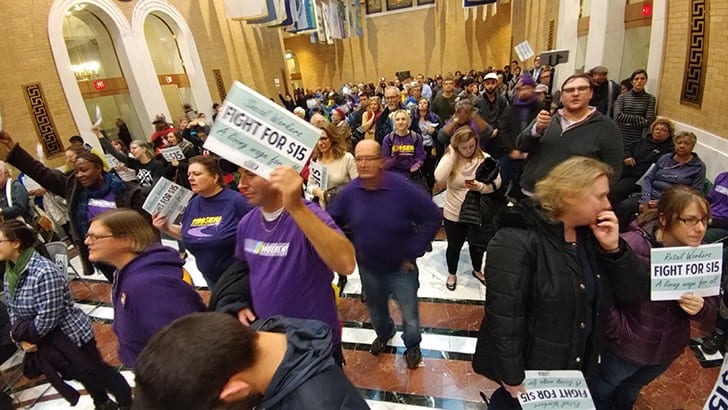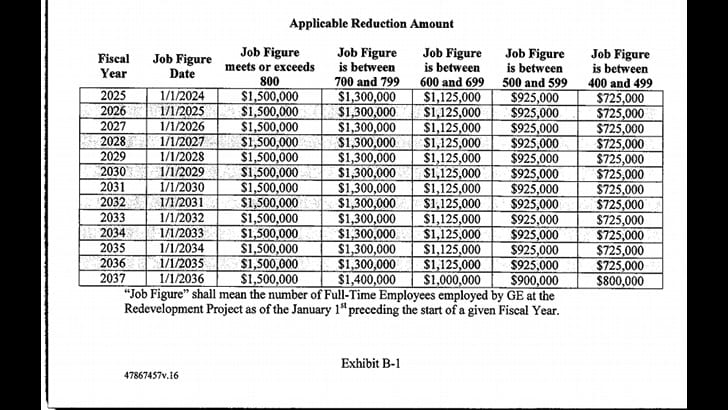
Why the Mass budget surplus is better spent on infrastructure needs
July 7, 2018
BY JASON PRAMAS @JASONPRAMAS
Having just been handed an estimated $1 billion budget surplus for the 2018 fiscal year, Gov. Charlie Baker was quick to make a proposal last week to divide up the unexpected spoils.
According to MassLive, “Around half of that will be placed in the state’s reserve account to be available in case of emergency. Gov. Charlie Baker on Friday laid out how he is proposing to spend the rest of that money, introducing a $583 million supplemental budget bill.”
And where does the surplus come from, readers might well ask? Well, the details are still a bit fuzzy, but the Trump administration’s drastic changes to the federal tax code months back seem to have resulted in what’s likely to be a very temporary state tax revenue increase.
Which explains why the Boston Globe paraphrased Noah Berger of the Mass Budget and Policy Center opining that “it would not be prudent for the state to spend the extra money from last fiscal year in the current one.” His preference being that “it should be spent on one-time capital expenses like roads or schools, or put away in the state’s savings account.”
But that’s not what Baker is proposing.
To be sure, there is money allotted for roads and the like. But only two items seem clearly earmarked for infrastructure expenditures: $50 million for cities and towns to fund local road and bridge maintenance and improvement projects, and $30 million for municipal clean water projects. Both worthy candidates for what is likely to be a one-time windfall.
The rest of the proposal is more problematic, however. Especially in its stated focus.
According to a July 13 press release from the governor’s office, “The administration is proposing a wide-ranging $72 million package to make school security upgrades in the Commonwealth’s schools and provide resources to students, staff, and first responders to better respond to threats within schools.”
Which is probably just red meat for Baker’s right-wing supporters. Massachusetts is definitely in dire need of more funding for K-12 and higher education. But it needs that funding on an ongoing basis.
What it doesn’t need is a supplemental budget better dubbed the “More School Cops and Surveillance Plan.”
Yet that’s exactly what Commonwealth students will get from the following proposed items that are part of the aforementioned $72 million section of the governor’s larger supplemental budget proposal:
- $20 million in matching grants for security and communications upgrades in K-12 schools and at public colleges and universities
- $4 million to provide training to school resource officers
- $2.4 million to create a tip line to provide public safety and school personnel with timely information on potential risks
- $2 million for a statewide “Say Something” campaign
It’s true that the proposed $40 million in additional aid to school districts in that same section to hire more social workers, mental health counselors, and psychologists is a good idea in general terms. But such an effort can’t amount to much if the funding evaporates next year. Something also true of most of the line items outside the ed-targeted package in the supplemental budget proposal that would provide funding for a variety of decent-sounding programs for K-12 and higher education, and “substance use prevention, education, and screening.” Plus a grab bag of other one-offs of varying importance like “$35.4 million for snow and ice removal costs in FY18” or wastefulness like “$8 million for multi-year municipal police training needs” (in a state that already spends vast sums on cops).
And, sure, we don’t want students (or school staff and faculty) to be vulnerable to killers with automatic weapons. But then we don’t want them to be vulnerable to asteroid strikes either, and most of what we could conceivably fund in the way of preparedness on that front would be about as useless as what the governor is proposing to fund for “school security.” Worse than useless, since the main result of such measures will inevitably be to increase official harassment of students of color and poor and immigrant students in their own schools. And the concomitant danger of their being shot for no reason. As the militarization of police proceeds apace. And their well-documented trigger-happiness is validated by the likes of Weymouth police Chief Richard Grimes in shockingly opportunist remarks at yesterday’s memorial for Weymouth Officer Michael Chesna—who was felled by a rock before being disarmed and executed by a random criminal over the weekend. Even as the K-12 school districts and the state colleges that serve those populations remain starved for funds with or without the FY18 surplus.
Regardless, there’s already a general decades-long trend toward stationing armed police on campuses nationwide, but that hasn’t stopped mass shooters from slaughtering students. There’s a veritable panopticon of surveillance measures from all levels of government on the population in general and on students in particular. Which also hasn’t prevented mass shooters from slaughtering students nationwide.
The things that might actually stop mass shooters from appearing in the Commonwealth—like stronger welfare and public jobs programs and more stringent gun control measures—are not in the cards in the current political climate. Even here in a supposedly left-leaning state that is unable to provide the first of those two needed reforms because it’s constitutionally prohibited from having a progressive income tax. The second, naturally, being blocked by a powerful and triumphalist gun lobby in this Age of Trump.
Fortunately, the legislature hasn’t weighed in on the FY18 supplemental budget yet—having failed to send the regular FY19 budget to the governor’s desk for his signature as of this writing either. So there’s still time for constituents to weigh in on how the surplus funds get spent.
And my suggestion would be to push your state reps and senators to fight for spending whatever part of the supplemental budget is not put into the “rainy day fund” on key capital projects. Like fixing public transportation infrastructure that stubbornly continues to disintegrate no matter how much Gov. Baker’s hand-picked MBTA flacks claim they don’t need any more money—as they had the temerity to do yesterday.
Once that’s done, then start agitating for the progressive tax system that would better fund state education, transportation, and social safety net programs for the foreseeable future. Because we badly need such reforms, and because—for those of you worried about a mass shooting at a Bay State school—families that have a stable income are less likely to produce violent misogynists and racists and nazis (oh my!), since they won’t need to find scapegoats for economic instability anymore.
Progressive taxation will be a very hard reform to win in the Commonwealth, as I’ve written many times in the past. But then so will better gun control legislation. Yet both are needed if we are going to have a more just, stable, and safer society.
We’ve got our work cut out for us. So let’s get cracking.
Apparent Horizon is syndicated by the Boston Institute for Nonprofit Journalism. Jason Pramas is BINJ’s network director, and executive editor and associate publisher of DigBoston. Copyright 2018 Jason Pramas. Licensed for use by the Boston Institute for Nonprofit Journalism and media outlets in its network.



